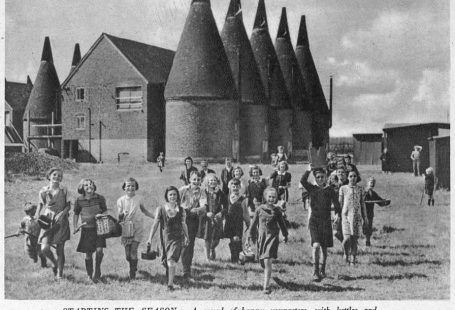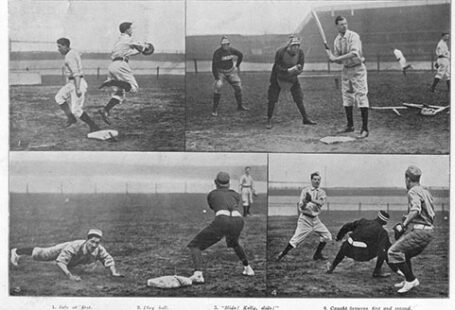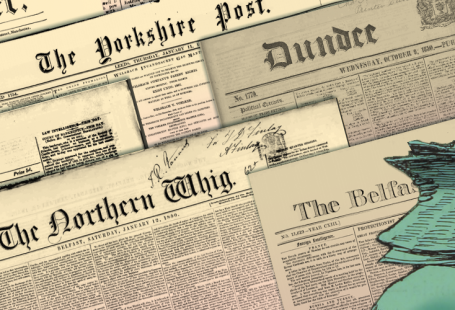This week has been as busy as ever at The Archive, as we have added 147,902 brand new pages to our collection. Moreover, we are delighted to welcome three brand new titles from England’s north west, as well as extensive updates to some of our regional, international and specialist titles.
So read on to discover which new titles we have added this week, to find out more about our updated titles, as well as to learn how public baths changed the lives of the working classes during the nineteenth century.
Register now and explore the Archive
Our three brand new titles this week all hail from the north west of England, namely from beside the River Mersey. And that’s not all they have in common! Each of our three titles have the name ‘Examiner,’ all being related to the Warrington Examiner. So without further ado, let’s meet these new titles!
First up is the Widnes Examiner. Published in the Lancashire town of Widnes, which lies north of the River Mersey, the Widnes Examiner was published every Friday priced at 1d. After the establishment of a chemical factory in the town in 1847, Widnes became a centre of the chemical industry. The Widnes Examiner appeared some twenty years after this, first published in 1869, under the editorship and management of Charles Hadfield.
Widnes Examiner | 9 March 1900
Just south of Widnes and the River Mersey lies the town of Runcorn, which also saw the establishment of its own Examiner newspaper in 1869, again under the management of Charles Hadfield. The Runcorn Examiner also cost 1d., and appeared every Friday.
Charles Hadfield, who ran both the Widnes Examiner and the Runcorn Examiner was a journalist who started his career at the Manchester Daily Examiner and Times, before moving to the Manchester City News and finally the Warrington Examiner, from where he managed and edited the Widnes and Runcorn titles. His journalism was of particular note for its understanding of the wants, habits and aspirations of the working classes. Furthermore, Hadfield took part in securing a Saturday half-holiday for workers, as well as providing public baths and wash-houses for local communities.
Runcorn Examiner | 31 January 1891
Hadfield eventually moved on to the Salford Weeky News, before he passed away in 1884.
But we have one more Examiner title to introduce this week, namely the St Helens Examiner. Another localised version of the Warrington Examiner, the St Helens Examiner was established in 1878 to serve St Helen’s and Prescott in Lancashire, circulating through ‘the entire district.’ Again in the tradition of its sister papers, the St Helens Examiner was liberal in its politics, and cost 1d.
St Helens Examiner | 19 December 1891
Moving away from the north west, you’ll find extensive updates to last week’s new title the Somerset and Radstock Observer, with its coverage of the Somerset towns of Radstock and Midsomer Norton, as well as the surrounding villages. You’ll also find updates this week to the Drogheda Conservative, which was published in County Louth, Ireland.
Moving still further afield, we have updates to the Civil & Military Gazette, which was published in what is now known as Pakistan. This was the first workplace of writer Rudyard Kipling, who called the newspaper his ‘mistress and love.’ We have added over 20,000 pages to this title, spanning the years 1876 to 1885. You can discover our other international titles here.
Last and by no means least are the updates we have made to our special cinema industry title the Kinematograph Weekly. We are delighted to say that we have added pages from four different decades to this title, running through the 1930s to the 1960s.
Kinematograph Weekly | 24 September 1942
The 1940s saw a resurgence of British film making, with Laurence Olivier’s Hamlet becoming the first British film to win the Academy Award for Best Picture in 1949. The 1940s also saw the production of Noel Coward classics like Blithe Spirit and Brief Encounter, and Ealing Comedies like Passport to Pimlico and Kind Hearts and Coronets.
Why not dive into the Kinematograph Weekly to find out more about these classics, as well as those from the 1950s? The 1950s saw a glut of British war films, as well as the beginning of classic franchises like the Carry On and Doctor in the House films. The end of the decade saw a loosening in censorship, which led to the production of the classic Hammer Horror films.
Kinematograph Weekly | 7 May 1953
Meanwhile, Kinematograph Weekly had changed its name to the snappier Kine Weekly in 1959, before it ceased publication in 1975.
Public Baths in Runcorn and Beyond
To honour Examiner journalist Charles Hadfield’s work in establishing public baths in the north west, we thought we’d take a look at the brief history of public baths, and their construction in the town of Runcorn and beyond.
A typical advert for public baths | Irish Society (Dublin) | 9 September 1893
Public baths were an absolute necessity for those who did not have access to private bathing facilities during the nineteenth and early twentieth centuries. As the industrial revolution swept the country, with people engaged in manual, often dirty work, this need for more sanitary conditions became more and more acute.
The first modern public baths were established in Liverpool in 1829. London’s first public bath was established in Whitechapel in 1847, following the 1846 Public Baths and Wash-Houses Act, which enabled local authorities to build public baths out of their own funds.
We dived into our new title the Widnes Examiner to find out more about public baths in the area. Whilst Widnes had its own public baths, the neighbouring town of Runcorn in 1893 still was without this particular advancement in sanitation.
View of Runcorn and Widnes from Halton | Illustrated London News | 3 February 1883
With this in mind, one correspondent wrote to the Widnes Examiner in September 1893 suggesting the ‘construction of an open-air swimming bath:’
Such baths exist elsewhere. Leicester possesses one…Many people would prefer an open-air swimming bath to an enclosed one with its stuffy atmosphere. The cost…would be very small. Such a bath as this would provide a great boon to the inhabitants of the town, especially during such tropical weather as has lately prevailed.
Penny Illustrated Paper | 5 August 1899
We wonder whether such tropical weather in Runcorn continued to prevail, but by May 1898 there was still no sign of the public baths which the town were without. Indeed, plans were being set in motion to build a ‘recreation ground and park,’ as reported in the Widnes Examiner.
But the article goes on to say that the ‘first and foremost need is that of a public bath,’ rather than a recreation ground, for:
During the summer the canals and other water-ways, as in past summers, will be requisitioned and made to serve the purpose of a public bath, or else the usual journey will be made to Widnes, both of which courses, are, however but illustrations of the desirability of meeting this pressing need.
Inhabitants of Runcorn, therefore, at nearly the turn of the nineteenth century were still washing in rivers and canals. The article concludes with this rallying cry:
Runcorn can wait for recreation grounds; but there is no reason why it should be made to do without a public bath. ‘Cleanliness is next to Godliness,’ and that some Runcornians would not be sorry to have some title to Godliness there can be no manner of doubt.
A few months later, the Widnes Examiner in July 1898 is reporting about ‘the absurd talk of making the Market Hall into a public bath.’ But come the new century, that is exactly what happened. Runcorn’s Market Hall was turned into public baths, which could be covered over and turned into a dance floor, or even a space for boxing and wrestling matches to take place!
Runcorn Guardian | 5 September 1908
Have you tried researching the history of your town or village? You’re sure to find some fascinating articles in our Archive – get started with your search here.
New Titles
Title |
Years Added |
| Widnes Examiner | 1892-1896, 1898, 1900-1902, 1904, 1906, 1908-1909 |
| Runcorn Examiner | 1873, 1891 |
| St. Helens Examiner | 1891 |
Updated Titles
This week we have updated six of our existing titles.
You can learn more about each of the titles we add to every week by clicking on their names. On each paper’s title page, you can read a FREE sample issue, learn more about our current holdings, and our plans for digitisation.
Title |
Years Added |
| Drogheda Conservative | 1852-1888, 1890-1896 |
| Halifax Evening Courier | 1940-1943, 1959-1960 |
| Kinematograph Weekly | 1931-1944, 1946-1947, 1953-1960 |
| Civil & Military Gazette (Pakistan) | 1876-1883, 1885 |
| Daily Record | 1897 |
| Somerset Guardian and Radstock Observer | 1904-1910, 1912-1962 |
You can keep up to date with all the latest additions by visiting the recently added page. You can even look ahead to see what we’re going to add tomorrow.
















